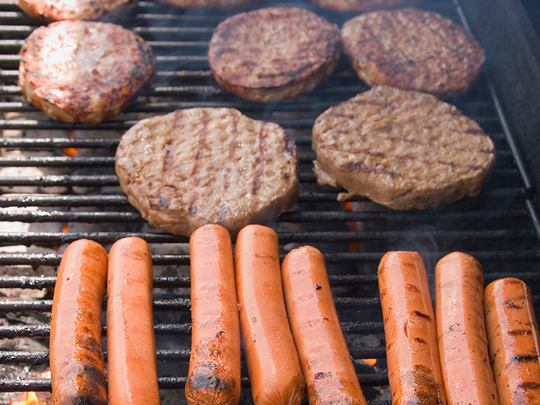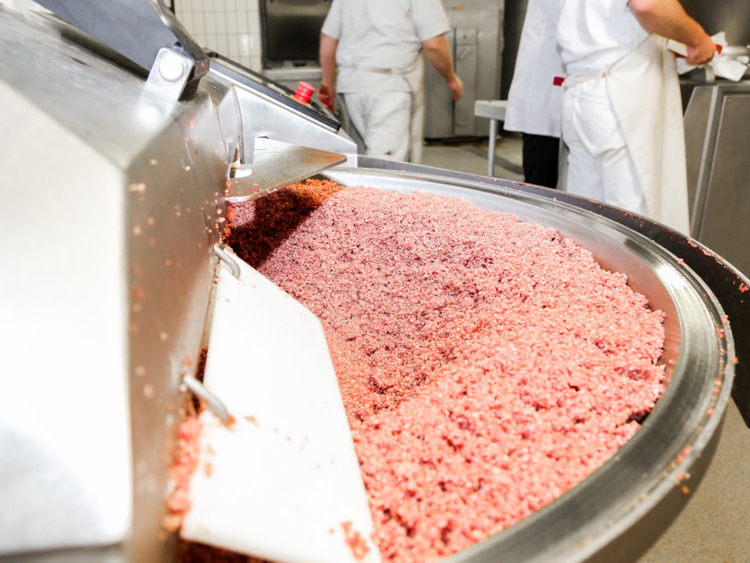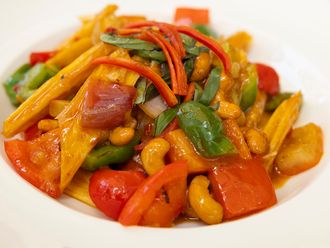
Dubai: Eating processed meat can lead to bowel cancer in humans while red meat is a likely cause of the disease, World Health Organisation (WHO) experts said on Monday in findings that could sharpen debate over the merits of a meat-based diet.
The France-based International Agency for Research on Cancer (IARC), part of the WHO, put processed meat such as hot dogs and ham in its group 1 list, which already includes tobacco, asbestos and diesel fumes, for which there is “sufficient evidence” of cancer links.
“For an individual, the risk of developing colorectal (bowel) cancer because of their consumption of processed meat remains small, but this risk increases with the amount of meat consumed,” Dr Kurt Straif of the IARC said in a statement.
Red meat, under which the IARC includes beef, lamb and pork, was classified as a “probable” carcinogen in its group 2A list that also contains glyphosate, the active ingredient in many weedkillers.
Source: Harvard Study
The lower classification for red meat reflected “limited evidence” that it causes cancer. The IARC found links mainly with bowel cancer, as was the case for processed meat, but it also observed associations with pancreatic and prostate cancer.
The agency, whose findings on meat followed a meeting of health experts in France earlier this month, estimated each 50 gram portion of processed meat eaten daily increases the risk of colorectal cancer by 18 per cent.
The IARC, which was assessing meat for the first time and reviewed some 800 studies, does not compare the level of cancer risk associated with products in a given category, so does not suggest eating meat is as dangerous as smoking, for example.
Health policy in some countries already calls for consumers to limit intake of red and processed meat, but the IARC said such advice to consumers was in certain cases focused on heart disease and obesity.
The preparation of the IARC’s report has already prompted vigorous reactions from meat industry groups, which argue meat forms part of a balanced diet and that cancer risk assessments need to be set in a broader context of environmental and lifestyle factors.
The IARC, which does not make specific policy recommendations, cited an estimate from the Global Burden of Disease Project — an international consortium of more than 1,000 researchers — that 34,000 cancer deaths per year worldwide are attributable to diets high in processed meat.
This compares with about 1 million cancer deaths per year globally due to tobacco smoking, 600,000 a year due to alcohol consumption, and more than 200,000 each year due to air pollution, it said.
If the cancer link with red meat were confirmed, diets rich in red meat could be responsible for 50,000 deaths a year worldwide, according to the Global Burden of Disease Project.
According to the latest survey of the British diet, the average adult eats around 71g of red meat a day.
The guidelines would bring the UN’s position in line with the World Cancer Research Fund (WCRF), which says there is convincing evidence that processed meat can cause bowel cancer.
But Dr Jill Jenkins, a GP and member of the Meat Advisory Panel, an industry sponsored body, said she would not be advising her patients to stop eating meat, but she did recommend caution over highly processed meat products.
“I think certainly that we should be keeping a low level, so everything in moderation,” she told the Today programme on BBC Radio 4.
“From the same body we have had advice about the carcinogenic effects of the air we breathe and the sun on our skin, so I think we have to take it within reason in that if you are stuffing in burgers and sausages and bacon every day, yes you are at risk.
“If you have some healthy, locally made high-protein sausage once a fortnight, well, I personally don’t consider that a risk.”
The Daily Mail, which reported on the WHO shift, said it had received the information from a “well-placed source”. In a note to the media, however, the WHO said: “Following random reports [on] Friday 23 October in the British press postulating on the outcome of the IARC evaluation on the carcinogenicity of red meat and processed meat, please note that there was no breach of embargo, as no embargoed material was shared with any news outlet, in Britain or elsewhere.”
— Compiled from agencies
Harvard Study: More food for thought
Researchers at Harvard Medical School also studied more than 120,000 people and suggested red meat increased the risk of death from cancer and heart problems.
■ The researchers analysed data from 37,698 men between 1986 and 2008 and 83,644 women between 1980 and 2008.
■ They said that adding an extra portion of unprocessed red meat to a daily diet increased the risk of death by 13 per cent, of fatal cardiovascular disease by 18 per cent and cancer mortality by 10 per cent.
■ The figures for processed meat were higher, 20 per cent for overall mortality, 21 per cent for death from heart problems and 16 per cent for cancer mortality.
— Guardian News & Media Ltd.

















